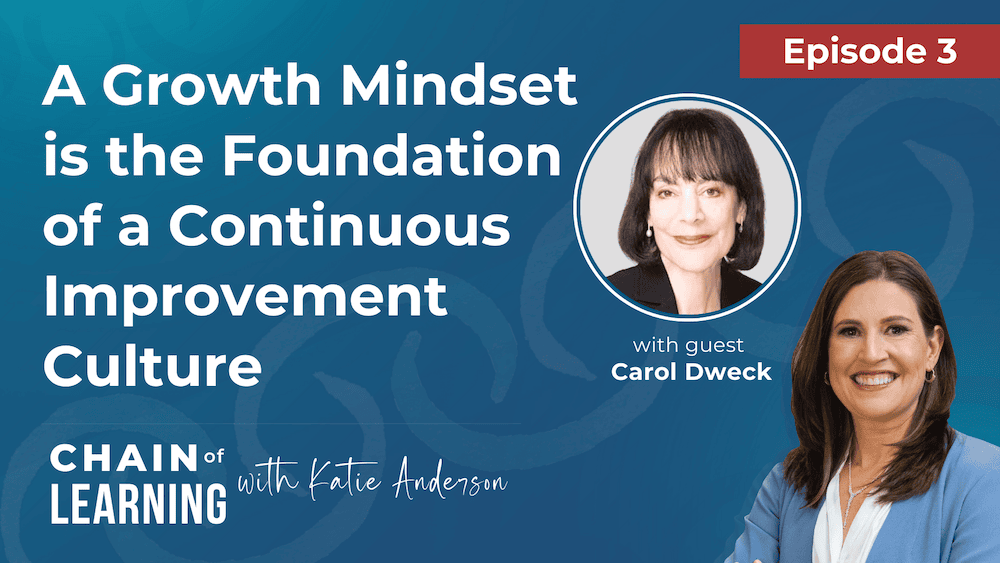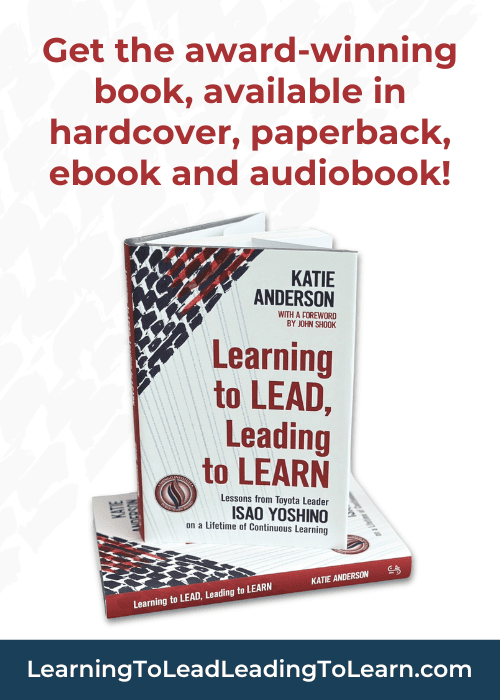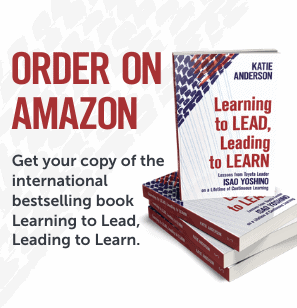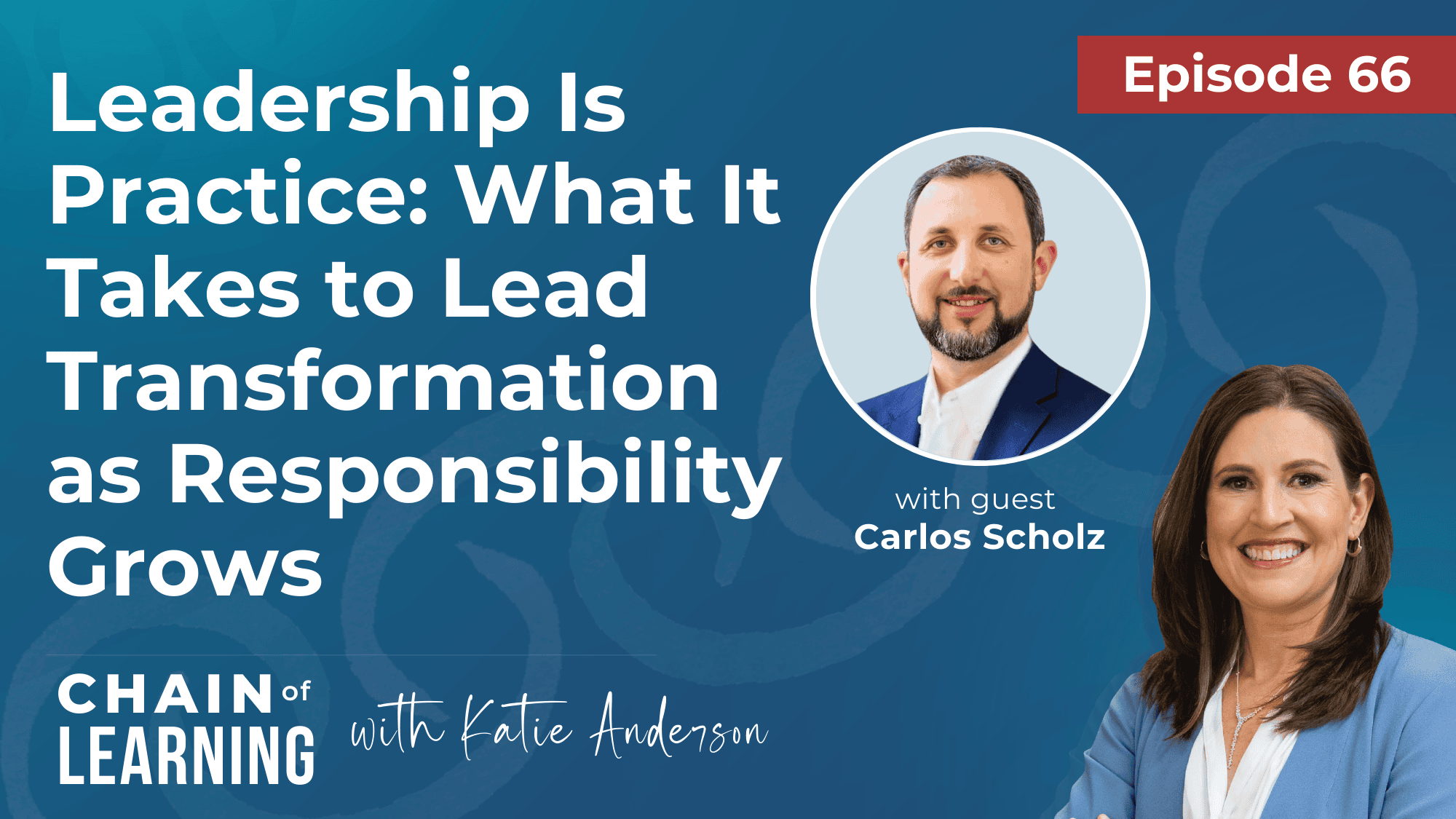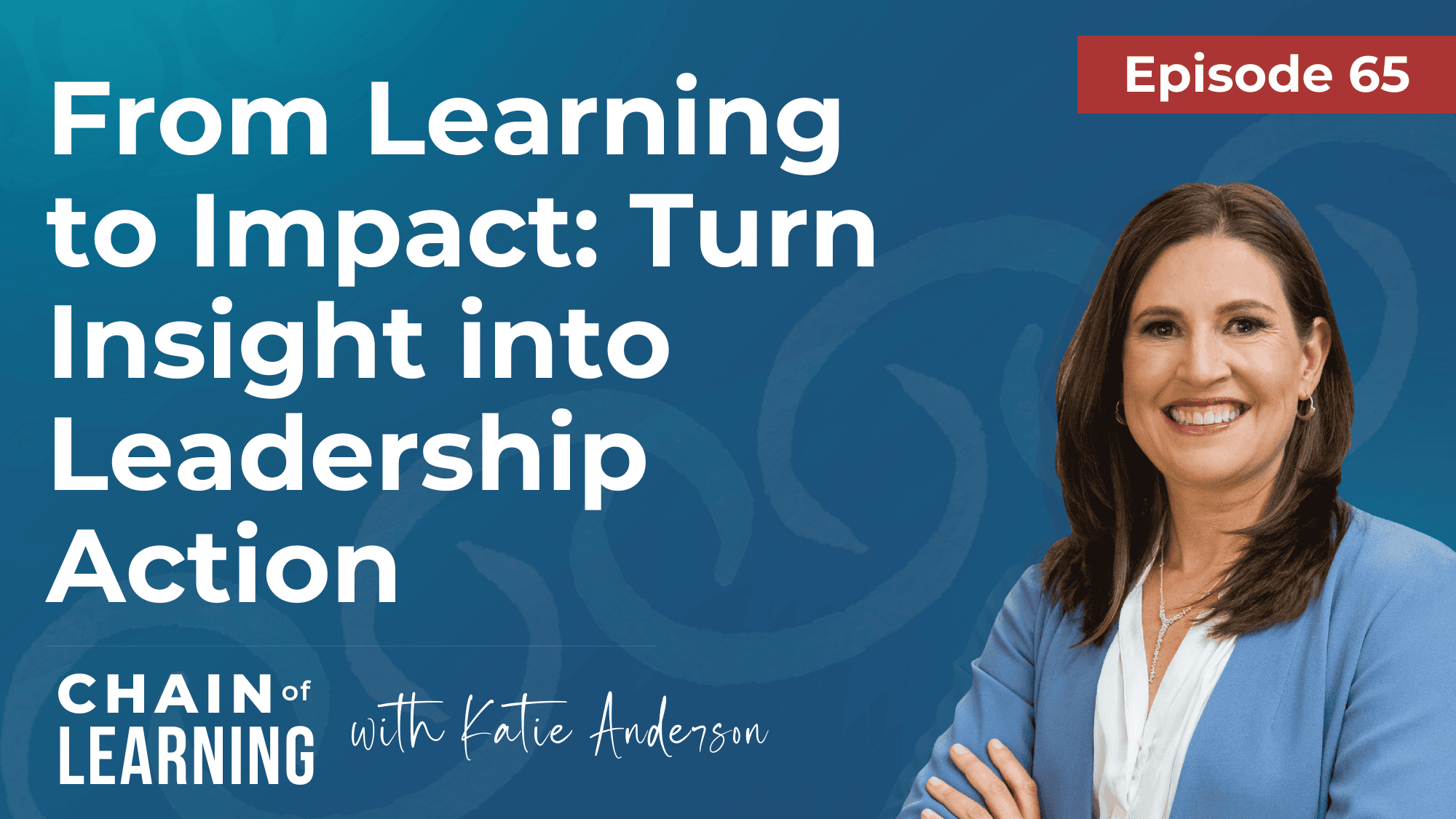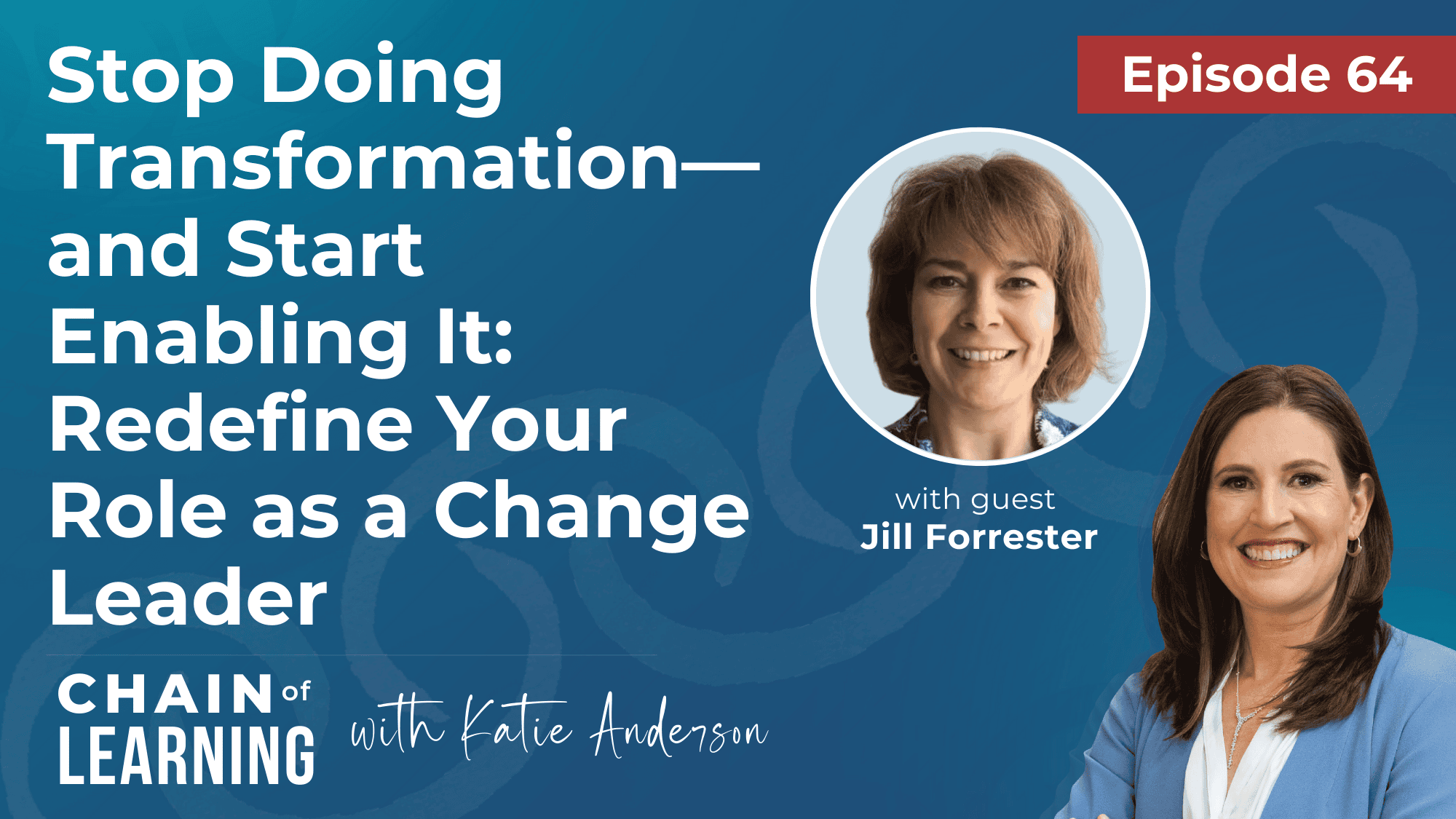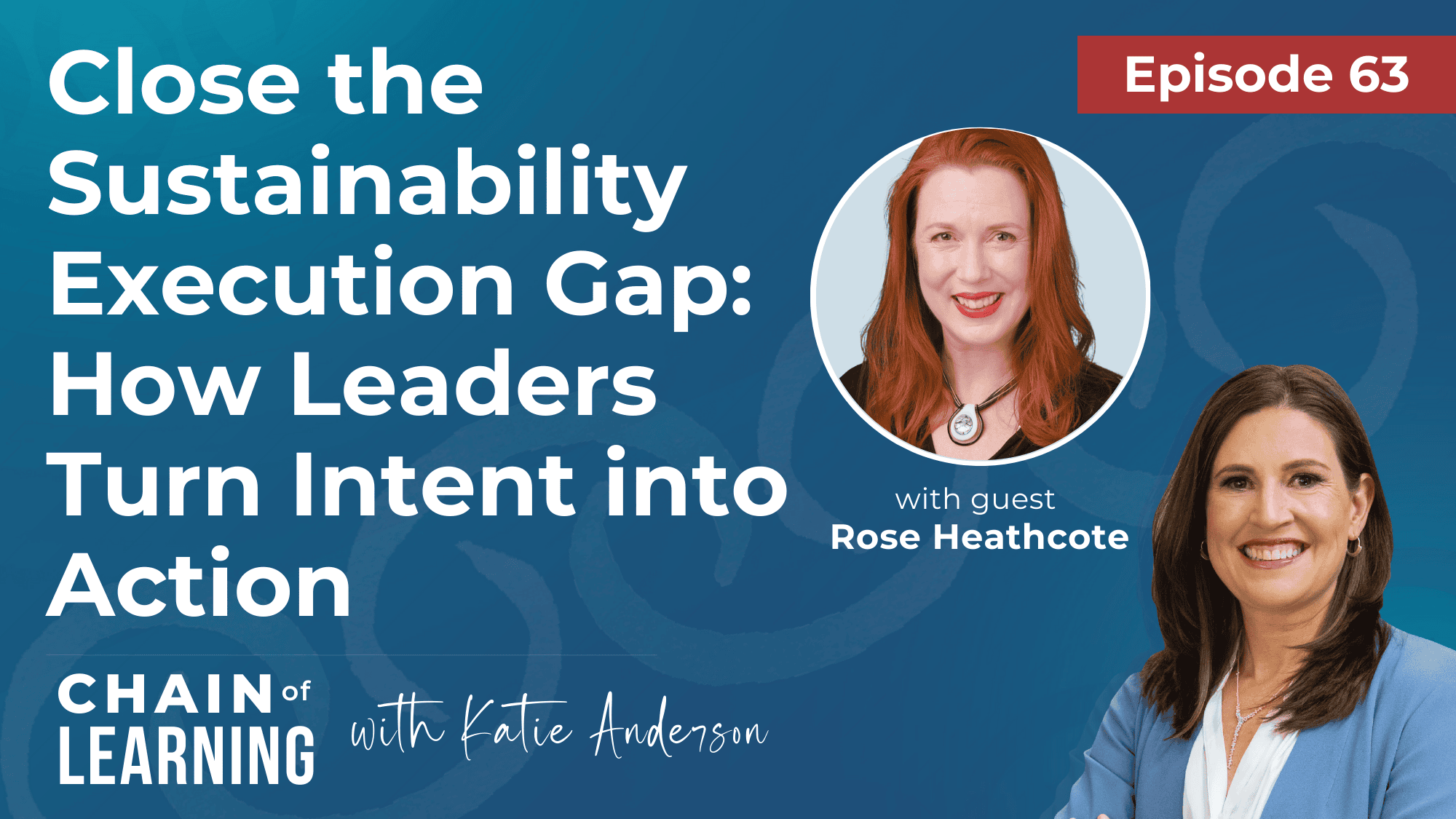Cultivating Organizational Growth, Learning, and Innovation
What is a growth mindset and how is it a critical foundation if you want to develop a culture of continuous improvement and operational excellence?
In this episode, I speak with Professor Carol Dweck – Professor of Psychology at Stanford University and bestselling author of Mindset – about how to develop a growth mindset – personally and in your organization – and achieve success.
Get comfortable with the struggle of learning something new
Helping people in your organization feel comfortable with learning something new can sometimes be a challenge.
This can be especially true with more senior leaders who have had success in their careers and might feel uncomfortable struggling with new skills while being out in front.
And if we are leading change, or used to being an expert with the answer, it can be challenging for us too.
In this episode, Carol Dweck and I sat down to talk about how we all can foster a growth mindset individually and how we can bring that mindset into our organizations to create a continuous improvement culture.
We discuss how success doesn’t happen from doing the same thing that you are good at over and over and strategies to get more comfortable with the discomfort that comes with stepping into something new. And Carol shares her tips to overcome a fixed-mindset organizational culture of “genius” where leaders are enforcers of rules rather than enablers of improvement and innovation.
In this episode of Chain of Learning you will learn:
✅ The difference between growth mindset and a fixed mindset
✅ How a growth mindset is the foundation for continuous improvement mindset – a “Lean mindset” – and organizational culture
✅ Carol’s recommendations for how leaders can create an organizational environment that embraces growth, experimentation, and learning from both failures and successes
✅ How sharing your struggles creating space for a supportive environment for others to share theirs will foster a culture of growth and achievement
✅ The next steps you can take to encourage a growth mindset in your organization and team – and make progress towards being the person you want to become.
Tune in to unlock this powerful continuous improvement and growth mindset strategy for yourself, your team, and your organization.
Watch the conversation
Watch the full conversation between me and Carol Dweck on YouTube.

About My Guest: Carol Dweck

Carol Dweck is a Professor of Psychology at Stanford University and is the bestselling author of Mindset, which has sold over 2 million copies globally.
She is best known for her theories on the mindset, motivation, and why people succeed (or don’t) and how to foster success. Her research has impacted a number of fields including education, business, healthcare, and parenting.
Professor Dweck’s TED talk, “The Power of Believing You Can Improve”, has been viewed over 15 million times.
Behind The Scenes of This Episode
Professor Dweck’s work has influenced me personally as a parent, and professionally as a coach, consultant, and leader. She is an important link in my own Chain of Learning® and I am thrilled for you to learn from her here now.

I was excited to meet Carol Dweck in person this September at The Lean Mindset event hosted by GE and GE’s CEO Larry Culp, where she was one of the featured speakers. GE had chosen both of our books Mindset and Learning to Lead, Leading to Learn as gifts to the Lean Mindset attendees.
Carol and I – along with Mark Graban, author of The Mistakes that Make Us, and Jim Womack, author of Lean Thinking were the four authors in attendance at the event.
When I found out that Carol and I were both going to be at the event, I asked my friend Eduardo Briceno (a business partner of Carol’s – who will be a guest on an upcoming episode of this podcast) if he would make an introduction.
Carol and I talked in advance of meeting in New York and I shared with her the links to my discussion with Larry Culp, CEO of GE, from the Association for Manufacturing Excellence Conference in 2022. We met and talked at the event and I loved listening to her conversation with Larry Culp onstage, as well as the other speakers (check out my overview of the event including links to listen to my post-event discussion with Jim Womack, Mark Graban, and Jamie Parker here).
Carol generously agreed to have a follow-up conversation with me to dive in further about the connection between a “lean mindset” and a “growth mindset”, and how leaders can bring a growth mindset into their company cultures – which is this episode here.
Be sure to tune in now if you haven’t already listened!
Important Links
- Carol Dweck’s bestselling book “Mindset”
- Carol Dweck’s discussion with Larry Culp at GE Event
- Check out Mark Graban’s podcast: My Favorite Mistake
- Listen in to Jamie Parker’s podcast: Lean Leadership for Ops Managers
- Watch our full discussion on YouTube
- Work with me – KBJAnderson.com
- Follow me on LinkedIn
- Watch the GE Lean Mindset videos here
Subscribe to Chain of Learning
Don’t miss the next episode! Subscribe or follow now on your favorite podcast player.
Share this episode with your friends and colleagues so we can all strengthen our Chain of Learning® – together!
Timestamps:
00:46: Discussion on growth mindset
02:00: Reflections on the lean mindset event
08:52: Reflections from the GE event
10:04: Importance of continual improvement
14:02: Leadership approach discussed with Larry Culp
16:06: Challenges faced by leaders, overcoming the fear of imperfection
19:05: Defining a growth mindset culture
23:17: The role of growth mindset in progressing within an organization
24:10: Challenges of implementing a growth mindset within an organization
25:40: Discussing supportive company culture
26:37: Discussing styles of teaching and management
30:34: Discussing stepping into the unknown and taking up challenges
32:38: Conclusion, reflections and invitation to listeners.
Full Episode Transcript
Carol Dweck: Not just chain of Learning, but chain of empowering. And often we think learning comes from the top and filters down. But Larry really embodies the idea it goes both ways. So I sense in these top leaders just this excitement of what they can learn at any given moment from anybody.
Katie Anderson: Welcome to Chain of Learning, where the links between leadership and learning unite. This is your connection for actionable, strategies and practices to empower you to build a people centered learning culture, get results and expand your impact so that you and your team can leave a lasting legacy. I’m your host and fellow learning enthusiast, Katie Anderson. What is a Growth Mindset and how is it a critical foundation if you want to develop a culture of continuous improvement and operational excellence? Have you ever wondered how you can help people in your organization feel comfortable with learning something new, especially senior leaders who have had success in their careers and might feel uncomfortable struggling with new skills while being out in front?
Katie Anderson: This conversation with Professor Carol Dweck must listen for any leader, continuous improvement practitioner or learning enthusiast about how to develop a growth mindset personally and in your organization. Dr. Dweck is a professor of Psychology at Stanford University and is the bestselling author of Mindset, which has sold over 2 million copies globally.
Katie Anderson: Professor Dweck’s work has influenced me personally as a parent and professionally as a coach, consultant and leader. She is an important link in my own chain of learning. I was so excited to meet Carol in person this September at the Lean Mindset event hosted by GE and GE’s CEO Larry Culp, where she is one of the featured speakers. GE chose both of our books, Mindset and Learning to Lead, leading to Learn as gifts to the Lean Mindset attendees. And Carol and I, along with Mark Graben, the author of The Mistakes That Make US, and Jim Womack, author of Lean Thinking. Were the four authors in attendance at the event. During one of the breaks at the Lean Mindset event, shortly after her talk on stage with Larry Culp, I asked Carol what she was learning through her conversation with Larry and listening to the other speakers about what a Lean Mindset means and how it relates to her concept of a Growth Mindset. She told me that a Growth Mindset is the foundation of a Lean Mindset. I asked her to expand.
Carol Dweck: Both lean And Growth Mindset deemphasize hierarchy say that there’s a lot to learn from people at all levels of an organization. Both say leaders don’t have all the answers, they’re the ones who ask the questions and then collaborate with people on answering them. Lean and Growth Mindset focus on continual improvement and within that, embracing bad news so you can keep problem solving. I did propose to you that the Growth Mindset can provide a psychological foundation for Lean Mindset. Let’s explore this now and see if we agree with it?
Katie Anderson: Yes, totally.
Carol Dweck: A growth mindset is the idea that everyone can develop their potential. Intelligence talents are not fixed. It doesn’t mean everyone’s the same or anyone can do anything. But it’s the belief that everybody can grow their abilities. And you never know what their potential for growth is until you go there.
Carol Dweck: In contrast, a fixed mindset is the belief that everyone has a certain level of intelligence or talent, and that’s that that’s who they are. And then the task becomes to find out who has it, who has more, who’s better than someone else, who is therefore more worthy than someone else. And we find that both mindsets create different worlds of meaning. So in a growth mindset, hey, you can get smarter by learning, by taking on challenging things and sticking to them. That’s what you want to do.
Carol Dweck: A setback natural part of learning. A struggle, natural part of learning. And so you keep trying new strategies. You seek help, collaboration, mentorship all in the service of growth. But in a fixed mindset, everything is more of a judgment.
Carol Dweck: Are you smart or aren’t you? Are you at the top of the hierarchy? Or should you get knocked further down? So you don’t want to take on a super challenging task that you might do poorly at. You want to do things you already do well so you can be judged smart.
Carol Dweck: Setbacks are threatening. Even high effort is threatening. Whoa. It doesn’t look like other people are struggling. So it’s really about measuring yourself, trying to look good rather than learn.
Carol Dweck: So I’m proposing that these mindsets have the seeds or create the foundation for the different kinds of organizations we see. And these have been studied extensively by my former student and now superstar Mary Murphy at Indiana University. So much of what I’m saying is from her great research anyway, why are people in some organizations so competitive in a toxic way? People in those organizations even tell us in surveys that there’s a lot of cheating or hiding information in order to get ahead. Why are they that way?
Carol Dweck: Well, they’re buying into this idea that people have a certain amount of talent, and we’re going to figure out who. And it’s a race to the top. But in a growth mindset, where everybody’s talent can be developed, that sows the seeds for mutual learning. Facing difficulties without laying blame. And in my session with GE, I told about my awakening to a growth mindset organization when I visited a big financial corporation.
Carol Dweck: So I arrive at the skyscraper, and someone opens the door for me. But not only that, he waves my book mindset at me and says, professor Dweck, we’ve been so looking forward to your visit. I thought, whoa. Then I go to reception. They say, Professor Dweck, we can’t wait to hear your talk.
Carol Dweck: Wow. I think my talk is not just for the financial muckamucks. It’s for everyone. And then I look around the lobby and I see these sign up sheets and I say, what are those? And those are special projects that anyone in the organization can sign up for.
Carol Dweck: And what’s the message there? It’s the message that we value every single person here and feel that they have tremendous growth within them and that they can contribute to the larger organization. Whoa. It was the first time I had really, really seen this in the flesh.
Katie Anderson: Yes, seen that. The manifestation of supporting a growth mindset in an organizational setting. Great reflections. And I agree with you in that comment that a growth mindset is so critical to everything. We call a lean mindset around creating a continuous improvement organization, creating continuous learning and improvement for ourselves as individuals, and then fostering that in teams and across teams as well.
Katie Anderson: And without that, seeing the ability to grow and change and we will be stuck. So it is the essence and how those links come together. I’m curious to Carol, what else did you discover from the conversations? And everyone at the GE event came from different backgrounds and maybe weren’t immersed in, say, lean thinking per se, but around this culture of continuous improvement and how leaders can really shape that with their teams and their people. What are some things that you heard from the people speaking at that event or that really resonated with you and what you teach?
Carol Dweck: I really resonated to the CEOs and other leaders talking about how they this chain of learning. They want to learn from the customer. They want to learn from the people who really build the product or deliver the service. This is so important because as we know nowadays, you don’t just have a product and run with it for 20 years. Maybe in the old days, but now everything’s so fiercely competitive and everything is undergoing so many transformations.
Carol Dweck: You really have to stay on top of what’s happening everywhere as a leader, therefore usher in the next generation of product in an informed way. Also, I mentioned one characteristic, probably of both lean and growth mindset. CEOs is not just that they engage in continual improvement, and I saw this at the conference too. But they take what? Satya Nadella the CEO of Microsoft called Moonshots.
Carol Dweck: When he became CEO, he created four or five projects that were huge risks. They were hugely expensive and not likely to succeed. But if even one of them succeeded, it was going to be great. And one of them did succeed, putting the company at the forefront of cloud technology. So it’s not just little learning, it’s big learning.
A Katie Anderson: And big learning informed by people in the whole chain, from consumer to CEO.
Katie Anderson: Absolutely. There are a few things I want to explore in there with you, and the first thing that comes to my mind is one of the end stories, which was a good portion of my book, learning to Lead, Leading to Learn. It talks about how Toyota invested in that same way from their organizational growth mindset. They had ideas for innovation and they invested in different groups to explore different products that may not ever make it to market. And they knew that that was part of the process to come up with a great idea, also needing to invest in exploring things that ultimately wouldn’t be great ideas.
Katie Anderson: But if you don’t put that investment in and the willingness to fail along the way, it’s never going to succeed. And the subject of my book actually was responsible for one of those failed ideas over ten years. And just like you mentioned in your discussion with Larry Culp at the GE event, that to create this growth mindset culture, the executives didn’t blame him for that failure. They actually said, thank you for taking that risk. We knew that we needed to try something new, and we both made some mistakes along the way.
Katie Anderson: And thank you because we learned so much. And I think that speaks so much, or I know that speaks so much to really how Toyota has created its people centered learning culture. And it’s the foundation of what we call lean, and that’s so ingrained in what they are. And then also that customer focus too. Go ahead.
Carol Dweck: Yes, I wanted to say, well, we have a Toyota. We lease and get a new one every three years. And every three years we’re kind of amazed at the new features that we didn’t have three years ago. We didn’t ask for them, but wow. First there was the backup screen and signal, and then a few years later we were on the highway.
Carol Dweck: Someone stopped short and our car stopped. It braked in a very gentle way, which prevented us from being in a four car pile up. Wow. We’ve just been so impressed that they’re improving, improving, improving. Now, I don’t know what the competition has that they might be trying to keep up with, but every three years seemed so impressive.
Katie Anderson: A lot of people, when they hear continuous improvement, they think those small, the small micro improvements, which are very important. But there’s also this improvement in growth mindset is about having those ongoing bigger improvements, the innovations, staying ahead of what your customers may even know that they need or want. Right. And that’s how we stay competitive and ahead of the times and not just survive, but thrive.
Carol Dweck: Yeah.
Katie Anderson: I’m curious, too. I know you had a chance to listen to my discussion with Larry Culp from my Fireside chat with him at AME, and you’ve heard him talk about his own leadership approach. What are some of the things that you thought were really stand out from how Larry was talking about how he’s trying to change this culture of GE to really one that’s founded on this growth mindset of continuous improvement and innovation.
Carol Dweck: So not just chain of learning, but chain of empowering. And often we think learning back to learning. We often think learning comes from the top and filters down. But Larry really embodies the idea. It goes both ways, and that’s true in many professions, like teaching.
Carol Dweck: One of the most profound things I ever heard a teacher say is that every student has something to teach me. Wow. No. Oh, I wish instead of, I wish this troublesome student weren’t in my class. I wish the kids learned no.
Carol Dweck: Every student has something to teach me about teaching, about myself, about the students, and what they respond to and what they need. So I sense in these top leaders just this excitement of what they can learn at any given moment from anybody.
Katie Anderson: That’s, to me the essence of this chain of learning, where it’s like the links. We’re all learners and leaders at the same time. Because even as you’re leading or teaching someone, you’re learning through that process as well. So it is all that continuous learning that leads me to a question I had as I was thinking about some of the discussion we could have here today. And one of the challenges I observe and the leaders I coach as well are feeling challenged about not being perfect, that there’s this, I guess, belief that when you’ve reached a certain level in an organization or a role that you should already know how to do these things.
Katie Anderson: And even though they have a belief and a growth mindset, they’re also challenged by this feeling that they already know she need to know how to be doing this. And so I try and coach them through that struggle. How do you help either teachers or other leaders or individuals move through that to be more successful in that growth when they’re already out in front of others?
Carol Dweck: One of the most powerful things ever is for a leader to reveal failures in their past or ways that they’ve struggled and are still struggling. I consulted some years back with another large financial organization, but in Australia it was kind of like a conference, a workshop for people just promoted to higher level management. I gave them permission. They needed permission to talk about their fears and uncertainties. I suggested that they form a network among each other, almost like a seminar about how it’s going, what I’m unsure of, what I need advice on.
Carol Dweck: How did you handle this? Do you have experience with that? It turned out I heard for years after that they were some of the best because they could face their struggles and share their struggles. Some of the best managers they had had. Again, problem solving is collaborative.
Carol Dweck: When my students or postdocs come to me with an issue or problem, I say, let’s figure it out.
Katie Anderson: It’s giving that right, walking alongside with them and providing the support if they truly are stuck, but giving them the space to learn and experiment. And you just not telling them, oh, here’s my answer to your problem.
Carol Dweck: But in a fixed mindset organization, you’re not allowed to say you’re struggling. It puts you lower on the hierarchy. Oh, I do want to talk a little bit about the difference between an individual having a growth mindset and an organization having a growth mindset.
B Carol Dweck: Right. So individuals might have a growth mindset, but then how do they bring that into an organizational culture or create that organizational culture?
Carol Dweck: Exactly. So many leaders originally see a growth mindset as something you give to everybody, and then the 10,000 individuals in the organization have a growth mindset. Or they see it as the workers responsibility to have a growth mindset and even take hard feedback and put it into whatever. But a growth mindset culture is a really different thing. It’s really about the practices and policies of the organization.
Carol Dweck: Communicating a growth mindset rewarding people for acting on their growth mindset, enabling them to. Because both in education and in organizations, we see a person can have a growth mindset coming out of their ears, but they might not be able to put it into practice if everyone’s competing and looking like they’re doing it easily, you’re not going to say you struggle, you’re not going to say you’re having a failure experience. No. You have to pretend to be one of the elite. And I talked at the conference about working with a department in a big tech company in Silicon Valley.
Carol Dweck: At the time, it was a super fixed mindset organization, and everybody was afraid of being judged not a genius or being inferior. And so working with this department, we discussed a lot of ideas. The one they really liked was the idea of starting every meeting, going around the table, and everyone saying what they’re struggling with, which I do in my seminars as well at Stanford among the students. And everyone is always shocked that all these people they admire and think are accomplishing everything easily. They’re shocked to find out that every person is struggling with something, and often they’re struggling with the same thing.
Carol Dweck: So they decide to struggle together. Or someone says, oh, this is what really helped me. Maybe it will help you. So there’s this kind of collective struggle, not this humiliation about and that’s what a growth mindset culture does. It creates collaboration, empowerment.
Carol Dweck: It rewards wise risk taking. It has your back if something goes wrong.
Katie Anderson: That’s so powerful. I often do similar things that what you do is I ask people to reflect on what they’re learning through the practice. And sometimes people share their successes, but more often than not, they start sharing their struggles. And then through sharing those struggles, they actually come together with a shared humanity. Almost like struggling is part of the process.
Katie Anderson: And how do we break that down?
Carol Dweck: Oh, can I just jump in. So every year I teach a freshman seminar. 15 freshmen. And a few weeks in, I do have them go around and share their struggles and everyone is shocked that every single person has struggles, even though they look so cool. And one year, this young man at the end of the Shush struggle sharing said, you know, I don’t think much of myself, but after hearing all of these fantastic cool people saying that they struggle too, maybe I’m okay.
Katie Anderson: That’s beautiful. And to be okay with that imperfection, you said that having to be the genius and the one with all the answers and being the expert all the time, and how can we break that down? And there are things we have become good at, but it’s okay not to be great at everything right away. And if we’re going to achieve something more, we have to go through that struggle process.
Carol Dweck: Yeah, you can’t keep doing the same thing you’re good at over and over and over. It’s not a recipe for success. And what’s interesting, in some research that we did together with Mary Murphy, people in Growth Mindset organizations said they feel that there’s more potential for them to rise within the organization. And their supervisors said that about them too, more than they did in the Fixed Mindset organization. And the reason I love that finding is the Fixed Mindset organization searches for the talent.
Carol Dweck: They hire the talent. They coddle and instruct the talent. They groom the talent. But a few years later, the supervisors aren’t saying that they see people growing and ready for higher level roles because they’re doing the same thing they’re good at all the time.
Katie Anderson: Right? So if we want people move up into different levels of roles and there’s always natural turnover, we do need to see that growth. Otherwise it will become stagnant both in what we’re doing, but our people as well, and they may leave. So we were talking about some of the challenges that leaders and others have about bringing. Maybe they have a growth mindset.
Katie Anderson: They understand that personally, it’s something they champion and believe strongly in. But then when they’re in an organization, I hear often like, oh, I feel under time pressure, or we have to just get our outcomes. I don’t have time to give people space for learning. And so we talk about that. I’d love to hear, what advice do you give to leaders?
Carol Dweck: Well, this pressure there’s pressure for teachers to rush through the curriculum and cover everything. I don’t have time to teach a Growth Mindset and change my practices to support it. And leaders too, accountability, shareholders, there’s this bottom line pressure all the time. It turns out in both cases, if you have a motivated and collaborative workforce or class of students, they carry a lot of the energy forward. There’s momentum.
Carol Dweck: Teachers say they end up having to do less at the end. Yes, kids know how to learn and they know how to help each other learn. Similarly, people in Growth Mindset organizations say they feel more committed. They will go the extra mile for the organization they feel trusted and supported. So you have everybody raring to go, loving the company, willing to put in the extra work.
Carol Dweck: How could that ever be worse compared to an organization where people feel not valued, judged, punished?
Katie Anderson: I know, it’s terrible.
Carol Dweck: Like flogging them to meet the bottom line.
Katie Anderson: I know. And it’s this tension, right, because we have an outcome or a result that we need to get. And then it feels shorter to shortcut it by telling people the answer or just giving your ideas and moving on. But in the long run, then you’re overburdening yourself with that responsibility and then continuing the status quo.
Carol Dweck: You become the enforcer and the punisher if they don’t meet the requirements as opposed to an enabler. And my plug for another former student, David Yeager at the University of Texas, is just completing a book on styles of teaching and management. And one is the enforcer, and at the other end is the mentor who embodies and supports growth mindset in the students and the workers.
Katie Anderson: That sounds like there’s some parallels to Professor Edgar Shine’s work on how we help. You can show up being the expert, and that’s not a bad thing, but you’re the one with the answers and the content knowledge versus being more this process coach and it just has different implications on people’s learning and problem solving. So I’ll be really interested to read that book and see some of the parallels to how I support organizations with continuous improvement. And I’m excited to be talking too, to Eduardo Brisenio soon about his new book, The Performance Paradox, because this really speaks to how do we have that learning zone in a safe place when we’re not having to be in the performance zone? And how do we have both so that we really can continue this growth mindset without that pressure, right, of feeling like it’s maybe a space where we don’t feel like there is that time to have those more mistakes and then.
Carol Dweck: To learn that and learn how learning takes you to the good performance. Of course there’s a bottom line. Of course we want to perform well, and how to do it optimally through learning is a great message of his book.
Katie Anderson: One of your messages, Carol, that’s really helped me as a parent and then as well as a coach and a leader, but is really about how not to label people know. It’s not about the about which leads to a fixed mindset, but it’s about the process of learning. And it’s not that like, oh, you’re so smart, but I really liked how you were applying yourself to get to that answer. And I was reminded during the GE event when Giannis was talking about a television presenter calling him a failure, and he’s like, I’m not a failure. I failed to reach the goal this year.
B Carol Dweck: But it doesn’t mean I’m a failure. It just means we have to keep learning and improving so that next time we can reach that goal.
Carol Dweck: Absolutely. Because many people do judge themselves as successes or failures based on the last win or loss, and that’s, as you might guess, more so within a fixed mindset. Yanice is saying, hey, I’ve got a long career ahead of me. Why are you calling my path, my journey, a failure? Because we didn’t win the championship this one year.
Katie Anderson: Right. It’s all in the process of learning. I’m curious, Carol. You can probably see behind me, I have all of these large figures called Daruma dolls from Japan. And are you familiar with them?
Carol Dweck: Briefly, yes.
Katie Anderson: So they’re these dolls and they represent really, that growth mindset. So there’s a Japanese proverb that says fall down seven times, get up eight. So you’re going to get knocked down. There’s going to be struggle, but it’s about how you get up and ultimately you’ll achieve your goal. So I’m showing Carol, if you’re watching the video, right know they’ll like little weebly wobbles and they come back up.
Katie Anderson: But I think they’re the greatest visual representation of what that growth mindset is all about. And we’ll ultimately achieve the performance or the goals that we want, but there is struggle in those learning as we get up and continue forward.
Carol Dweck: I love that, and I love that it’s a visual representation because often when people are down, when we’re down, where we get mired in it and don’t remember what up feels like.
Katie Anderson: Yeah, it keeps getting up. And you’ll find your way forward if you have that fortitude and that belief that it’s okay to get knocked down. It’s about the process of getting up. I’d love to end today with you expanding on the advice that you ended your talk with Larry Culp at the GE Lean Mindset event. He asked you what was your one piece of advice in addition to leaders sharing their struggles to move forward with more of a lean sorry.
Katie Anderson: Of a growth mindset, which, as we’ve talked about today, is the foundation of a lean mindset. And you said, do something you’re not comfortable doing, but that the person you want to be would do. Can you elaborate on this, please?
Carol Dweck: Yes. In my freshman seminar a few weeks in, I give students an assignment. Do something outrageously, growth mindset, something you would never consider doing. And of course, nothing dangerous or foolhardy, but something the person you want to become would do. At the end of my session with Larry, I came back to that and I said to the audience, do something that will take you toward the person you want to become but haven’t yet had the courage or learning to be or something outrageously.
Carol Dweck: Growth mindset for your company, for others in your company, your choice.
Katie Anderson: It’s so powerful. Step into the person you want to be and be okay that that’s not the person you’re at right now. And that’s such powerful message. Not only for individuals, but also people who are coaching and developing others as teachers, as executive coaches, or as leaders who are working with their direct reports. How do you help people have that space to step into something more that they’re not comfortable with today and provide that support?
Katie Anderson: Thank you so much, Carol, for being here today. Thank you.
Carol Dweck: My pleasure.
Katie Anderson: Thank you to Carol Dweck for joining me here on Chain of Learning. If you’re interested in learning more from Carol, I’ve put the links to her book Mindset and her discussion with Larry Culp from the Lean Mindset event in the Show Notes. I learned so much from this conversation with Carol Dweck. A few key insights that stand out to me are that a chain of learning is also a chain of empowering that success doesn’t happen from doing the same thing that you’re good at. Over and over, you have to be willing to step into something new, and that sharing our struggles and by helping create the space for leaders and team members to share their struggles with each other, is what really helps foster a supportive community and a culture that cultivates growth and continuous improvement.
Katie Anderson: Reflection is the beginning of learning, so I invite you to reflect on this episode. First, what is something you’re taking away from this conversation and will put into practice to foster a growth mindset in yourself, your team or organization? And second, I encourage you to take up Carol Dweck’s challenge. What is something that you will do that perhaps you don’t currently feel capable or confident of, but that the person you want to become would do? For me, stepping into podcasting is that new thing.
Katie Anderson: So thank you for joining me on this journey of learning and growth as I step into podcasting and as we discover how to grow personally and collectively to strengthen our chain of learning. And be sure to check out episode two of Chain of Learning, where Jamie Parker and I reflect on the Lean Mindset event and specifically talk about how to develop a culture that fosters a growth mindset by bringing in more emotion, empathy and love into the workplace. And episode 125 of Jamie’s Lean Leadership for Ops Managers Podcast, where we explore how to develop a growth mindset as a leader. And I highlight a phrase that I learned from Carol Dweck that can really help you foster a growth mindset in yourself and in others. And for real time reflections about the Lean Mindset event, listen in to the post event discussion that I recorded with Jamie Parker, Jim Womack, the author of Lean Thinking, where the term Lean was first coined, and Mark Graben, author of The Mistakes That Make US immediately after the Event, which is available on Mark’s Lean blog podcast.
Katie Anderson: The links to these podcasts are in the Show Notes, so be sure to follow and subscribe to Chain of Learning Now and share this podcast with your friends and. Colleagues so we can all strengthen our chain of learning together. Thanks for being a link in my chain of learning today. See you next time.
Subscribe now
Subscribe today so you never miss an episode. And, please share this podcast with your friends and colleagues so we can all strengthen our Chain of Learning – together.

